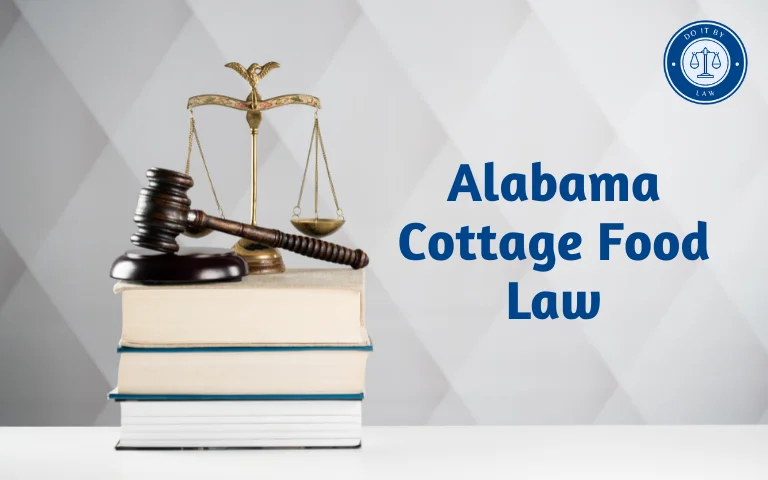Alabama Cottage Food Law: What You Need to Know
Alabama cottage food law allows in-home producers of certain food items to sell directly to consumers without needing a commercial kitchen.
Understanding exemptions, licensing rules, allowed products and other components help home bakers remain compliant. This guide covers everything needed to legally operate a cottage food business in Alabama.
When Were Alabama Cottage Food Laws Passed?
Alabama first enacted laws easing restrictions on homemade foods sold directly to consumers in 2014 under the Alabama Cottage Food Production Act.
Prior to this, any food products sold to the public were subject to commercial kitchen licensing and preparation rules overseen by the Alabama Department of Public Health (ADPH). The cottage food law alabama created an exemption for low-risk foods made in home kitchens.
This enabled small-scale entrepreneurs to legally produce baked goods, jams, jellies, and other approved items from their homes to sell directly to customers at farmers’ markets, online, or through other direct sales channels. Alabama joined a national trend of states loosening regulations on home-based food businesses.
Why Was Cottage Food Law Passed in Alabama?
There were several motivating factors behind passing the cottage food law alabama act:
1. Supporting Home-Based Entrepreneurs:
- Promote Economic Growth: The law aimed to provide opportunities for individuals to generate income by crafting and selling homemade food products from their homes, fostering entrepreneurship and supporting local economies.
- Create Flexibility: Individuals, particularly stay-at-home parents or retirees, could find a flexible income source without needing a commercial kitchen or storefront.
2. Expanding Food Choices:
- Increase Variety: The law allowed for the sale of a wider range of homemade food items, offering consumers new and unique options beyond what traditional grocery stores and restaurants provide.
- Support Local Agriculture: Cottage food producers could potentially incorporate locally sourced ingredients, promoting sustainable and regional food systems.
3. Balancing Safety and Accessibility:
- Regulation with Limited Burden: Compared to the licensing and inspection requirements for operating a formal food business, the Cottage Food Law offered a less-burdensome regulatory framework for home-based producers, making it more accessible for entry.
- Food Safety Measures: The law still enforces basic safety standards, like requiring food handlers to attend food safety courses and follow labeling and handling regulations.
4. Responding to National Trends:
- Growing Popularity of Cottage Food: The increasing interest in homemade and artisanal food products across the country influenced Alabama’s decision to join the growing number of states with similar laws.
- Consumer Demand: Public demand for access to locally made and potentially healthier food options contributed to the legislative push for the Cottage Food Law.
Overall, the Cottage Food Law in Alabama represents a balance between encouraging home-based food entrepreneurship, providing consumers with new choices, and upholding basic food safety standards.
Who Does Alabama Cottage Food Law Apply To?
The Alabama Cottage Food Law applies to individuals who produce and sell certain non-hazardous food items from their homes. Here’s a breakdown of who can participate:
Eligible Participants:
- Individuals: The law focuses on individual home-based businesses, not commercial entities.
- Location: Production and sales must occur within the producer’s private residence.
- Food Types: Permitted items include baked goods, jams, jellies, preserves, candy, dried and dehydrated fruits and vegetables, fermented products (with specific requirements), and non-potentially hazardous snacks.
- Sales Channels: Direct sales are allowed through various channels, including:
- In-person at farmers markets, craft fairs, or other authorized events.
- Online orders with delivery or pick-up at the producer’s home.
- Phone orders with delivery or pick-up.
Exclusions:
- High-Risk Foods: Items requiring time and temperature control for safety, such as meat, poultry, dairy products, and unpasteurized juices, are not allowed.
- Restaurants and Grocery Stores: Cottage food products cannot be sold to restaurants, grocery stores, or other resale establishments.
- Large-Scale Production: The law has limitations on production quantities and income thresholds. exceeding these limits requires licensing and operating as a full-fledged food business.
The cottage food law alabama does not apply to those selling to retail establishments like grocery stores or restaurants. It also excludes high-risk foods requiring extensive safety precautions. Finally, producers grossing over $20,000 annually in cottage food sales must upgrade to a commercial kitchen and permitting.
Key Provisions of the Alabama Cottage Food Act
The current law, passed in 2014 and revised in 2021, outlines the regulations for individuals to produce and sell certain non-potentially hazardous foods from their homes without needing a permit or inspection from the Alabama Department of Public Health (ADPH).
Permitted Foods:
- Low-risk, non-potentially hazardous foods: Bakery items, jams, jellies, preserves, candy, dried and dehydrated fruits and vegetables, fermented products within specific parameters, and non-hazardous snacks.
- Items requiring temperature control are prohibited: Meat, poultry, dairy products, and unpasteurized juices are not allowed.
Sales Channels:
- Direct sales: Farmers markets, craft fairs, online orders with delivery or pick-up at the producer’s home, phone orders with delivery or pick-up.
- Resale is prohibited: Cannot be sold to restaurants, grocery stores, or other resale establishments.
Production and Location:
- Home-based production: Must be produced in the producer’s private residence.
- Production limitations: Limits on quantity and income thresholds. Exceeding these requires licensing and operation as a full-fledged food business.
Regulations and Requirements:
- Food safety training: Completion of a state-approved food safety course is mandatory.
- Labeling: Proper labeling with name, address, ingredients, allergen information, and “Cottage Food Product” statement.
- Recordkeeping: Maintenance of sales and production records.
- Licensing and inspections: Not required for cottage food, but standard food establishment regulations apply if production or sales exceed set limits.
Additional Points:
- Direct sales only: Selling through third-party distributors or platforms is not allowed.
- Inspections may occur: The Alabama Department of Public Health can conduct inspections of home-based production facilities.
- Compliance is crucial: Violations can result in fines and potential confiscation of products.
So in summary, baking and some other low-risk goods are approved for home kitchen production under cottage laws but sales channels and volumes are limited. Proper labeling provides transparency.
Penalties for Violating Alabama Cottage Food Law
The penalties for violating the Alabama Cottage Food Law can vary depending on the specific nature of the violation and the severity of the offense. Here’s a breakdown of potential consequences:
Minor Violations:
- Warning: For minor infractions like improper labeling or recordkeeping, the first offense may only result in a warning and an opportunity to correct the issue.
- Fines: Subsequent minor violations could lead to fines, typically starting at $100 and increasing for repeat offenses.
Major Violations:
- Cease and desist order: The Alabama Department of Public Health can issue a cease and desist order, prohibiting the producer from selling any further cottage food products until necessary corrective actions are taken.
- Confiscation of products: In cases of potential food safety hazards or severe violations, the department may confiscate and destroy any contaminated or improperly produced food products.
- Higher fines: More serious violations can result in significantly higher fines, ranging from several hundred dollars to even thousands of dollars.
Repeat Offenses:
- Increased penalties: Each violation adds to the severity of potential consequences, with larger fines, longer suspensions of sales, and potentially even criminal charges in extreme cases.
- Blacklisting: Repeated disregard for the law and food safety regulations could lead to the producer being blacklisted from participating in the Cottage Food program altogether.
Additional Consequences:
- Damage to reputation: Even without formal penalties, public awareness of violations can significantly damage the producer’s reputation and harm their cottage food business.
- Legal liability: In cases where a contaminated product causes illness or harm, the producer could face legal liability and potential lawsuits.
Unapproved foods, improper sales to retail rather than directly to consumers, excessive volumes over $20,000 annually, or gross negligence that threatens public health could all trigger enforcement actions. Penalties aim to achieve compliance rather than punish minor mistakes.
Recent and Proposed Changes to cottage food law alabama
Recent years have seen some proposals to update the Alabama Cottage Food Act:
- 2017 – A bill to allow limited on-farm sales failed to pass
- 2018 – Considered expanding allowed products to include non-hazardous foods but did not amend
- 2019 – Weighed raising sales limit from $20,000 but left threshold unchanged
- 2020 – COVID-19 concerns prompted talk of easing restrictions but no changes resulted
- 2021 – Discussed standardizing county-level rules and enforcement but tabled a proposal
- 2022 – Debated revisiting sales limits and non-hazardous food expansions but no action
While some tweaking has been discussed, the Alabama Cottage Food law largely continues as originally passed. Expansions to food types, sales limits, and channels remain stalled for now.
Controversies and Challenges With Alabama Cottage Food Act
Several areas of debate and issue persist around the Alabama Cottage Food Act:
- Inconsistent health department oversight between counties
- Restrictions on sales channels beyond direct-to-consumer
- Limitations on volume make scaling cottage foods difficult
- Restrictions on certain popular food items like roasted coffee
- Permitted products have not been expanded since the original law
- Insurance and liability risk confusion for home producers
- Cottage kitchens in unapproved facilities like restaurants
Reconciling food safety, business growth and consumer demands remains an ongoing balancing act under the Cottage Food law. However, the Act provides a legal pathway that did not previously exist in Alabama prior to 2014.
Frequently Asked Cottage Food Law Questions
Conclusion
Alabama Cottage Food Act eases regulations on certain home-produced food items, enabling small business development. Rules around licensing, sales channels, food categories, and volumes protect consumers while fostering culinary microenterprise.
Home cooks and bakers should review state guidelines closely to remain compliant with health authorities and continue legally operating. With patience and persistence, the Alabama Cottage Food Act provides the essential recipe for kitchen entrepreneurs to succeed.







